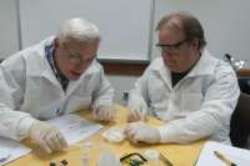A Nanotechnology Discovery Academy conducted in Indiana University-Purdue University Indianapolis (IUPUI) campus, between July 11 to 15, 2011, has offered a good opportunity for 13 high school teachers from Indianapolis and its surrounding regions to explore how enhancement of Science, Technology, Engineering, and Mathematics (STEM) education can be addressed by employing advanced nanotechnology researches and approaches.
 Faculty at the Nanotechnology Discovery Academy
Faculty at the Nanotechnology Discovery Academy
The teachers participating in the Academy collaborated with staff members from the Center for Research and Learning and the faculties of Integrated Nanotechnology Development Institute, both of which situated inside the IUPUI campus. The learning aids offered by the Academy will enable school teachers to impart students ways that help them to solve societal problems and gain analytical thinking abilities. Several teachers decided to use the knowledge gained in the Academy in the classrooms and impart the same meaningfully and appropriately.
Nanotechnology deals with the manipulation of materials in the nanometer-based scale, 1 nm is equivalent to one billionth of a meter or it is 100,000 times smaller than a human hair diameter. This revolutionary field is playing a vital role in medicine, engineering, science, and several other disciplines. The teachers gained knowledge about several nanotechnology techniques, approaches, and concepts that can be conveyed to students over a wide range of chapters and topics in the classroom.
Associate Director of Research Development in the office of the Vice Chancellor for Research, Mangilal Agarwal who is the Academy Director stated that the participating staff were provided with simple nanotechnology learning tools such as nanomedicine project design, lab-on-a-chip, fuel cells, and solar panels developed using everyday resources to carry to their classroom. According to Kody Varahramyan, Vice Chancellor for Research at IUPUI, this program has been initiated for supporting national and state requirements of teachers who are capable of rendering better training to students in STEM fields.